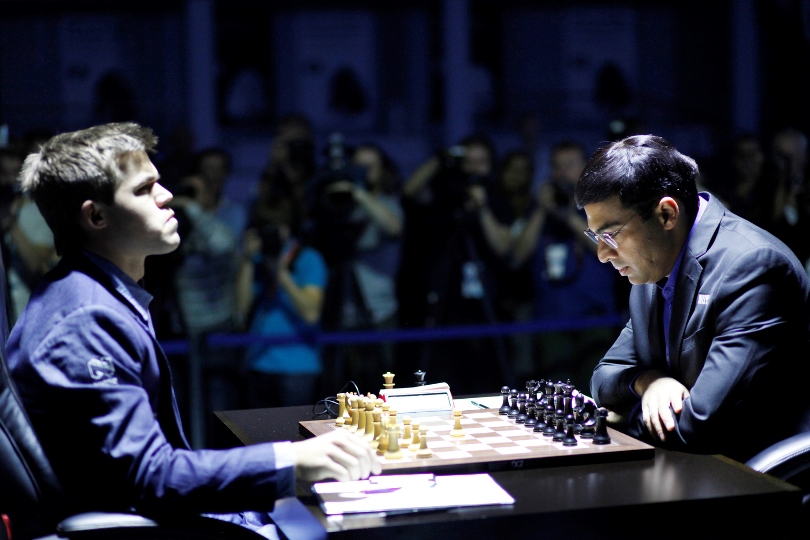One year after the Carlsen – Anand 2013 match in which Magnus ended Anand’s long reign and became World Champion, the chess community braced for the reprise of that match.
In contrast to the first match, which was played on Anand’s home soil, in Chennai in India, this time the venue was the city of Sochi, in Russian Federation.
Anand gained the right for a „return match“ by winning the Candidates tournament held earlier in the 2014 In a star studded lineup consisting of Anand (the loser of the 2013 World Championship Match), Topalov and Mamedyarov (top two finishers of the FIDE Grand Prix Series), Kramnik and Andreikin (2013 World Cup finalists), Aronian and Karjakin (two highest rated players) and Svidler (FIDE Wild Card), Anand finished a full point ahead of the nearest competitor. Although many have written him after the match with Carlsen due to his age (Anand had already celebrated his 44th birthday), Anand proved that he can still play on the highest level.
The result of the Candidates tournament was already a warning sign for the newly crowned champion. And indeed, the 2014 Sochi match proved to be a much tougher and closer match then the one played a year before, which was a relatively smooth cruise for Magnus.
This is not surprising. Garry Kasparov wrote extensively about psychological difficulties that the champion has to overcome when playing a return match (as his 1987 Seville match against Karpov demonstrated). History is full of similar examples, with Botvinnik matches against Smyslov in 1957 and against Tal in 1961 being most notable.
Initially, it seemed that Anand again won’t be able to withstand’s Carlsen’s grinding style as he suffered a terrible loss in his first Black game. In the 4 d3 anti-Berlin, Carlsen went for exchange on c6, carried out the favorable d4 plan and displayed great ingenuity with the Ra3 inclusion of his rook in the game. Anand was unable to cope with his problems and lost pretty much without putting any serious resistance.
However, already in the very next game he leveled the score by beating Magnus in the Bf4 Queen’s gambit with the help of some deep opening preparation. This immediately led to a different situation compared to the previous match, where Anand was unable to score a single win. This loss put Carlsen in a difficult psychological situation.
The subsequent course of the match proved that Carlsen was slightly shaken. After two quiet draws, the crucial sixth game of the match happened. After building typical Carlsen pressure in a typical queenless position, Magnus suddenly committed a horrible 26 Kd2??.
Who knows which course would the chess history take if Anand exploited this chance.
After this glimpse of luck, the remainder of the match resembled the Chennai encounter. Magnus clearly gained confidence, and after a couple of draws also won the 11th games, by breaching Anand’s Berlin endgame. Thus, with the score standing at 6.5-4.5 (or 3-1 in terms of decisive games), Carlsen won the match before the end and managed to retain his crown.

